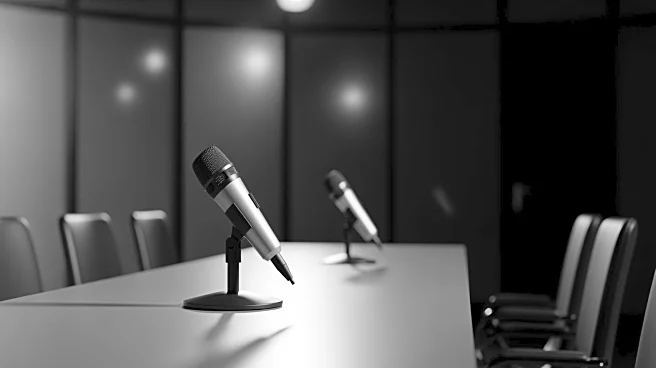What's Happening?
Defense Secretary Pete Hegseth has introduced new reporting rules at the Pentagon, prompting dozens of journalists to turn in their access badges and leave the premises. The rules require journalists to obtain approval before reporting on any information,
classified or unclassified, which has not been sanctioned for release by Hegseth. This move has been met with widespread rejection from news organizations, who argue that the restrictions threaten press freedom and hinder independent journalism. The new policy has led to a significant reduction in the flow of information from the Pentagon, with Hegseth having held only two formal press briefings and restricting access to various parts of the building. President Trump has expressed support for these rules, citing the press as disruptive to world peace and dishonest.
Why It's Important?
The imposition of these new rules at the Pentagon represents a significant shift in the relationship between the U.S. government and the press. By restricting journalists' ability to report freely, the policy could undermine the public's access to information about military affairs and government actions. This development is likely to impact the transparency and accountability of the Pentagon, as journalists play a crucial role in scrutinizing government operations. The move has sparked concern among media organizations and advocates for press freedom, who view it as an erosion of democratic principles. The support from President Trump further highlights the ongoing tension between the administration and the media, which could have broader implications for press freedom in the U.S.
What's Next?
News organizations have vowed to continue covering military affairs despite the new restrictions, albeit from a greater distance. The Pentagon Press Association, representing multiple news outlets, has spoken out against the rules, and journalists are expected to find alternative ways to gather information and report on military activities. The situation may lead to increased reliance on unofficial sources and social media for information, potentially affecting the quality and reliability of reporting. The ongoing conflict between the press and the administration could result in further legal challenges and public debates about the role of media in democracy.
Beyond the Headlines
The new reporting rules at the Pentagon raise ethical concerns about the balance between national security and press freedom. By controlling the narrative and limiting access to information, the government risks creating an environment where public discourse is shaped by selective reporting. This could lead to a less informed public and a weakened democratic process. The situation also highlights the cultural divide between the administration and the media, with differing views on the role of journalism in society. Long-term, these developments could influence how future administrations interact with the press and manage information dissemination.
















